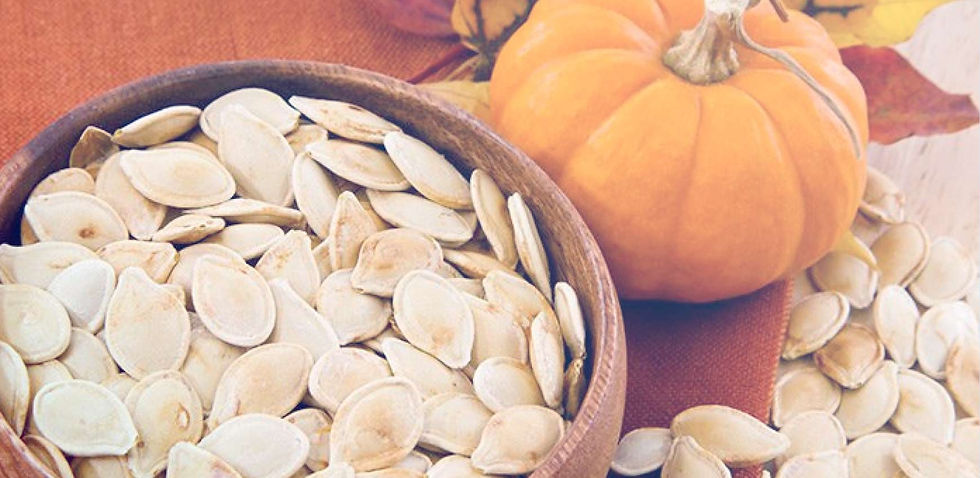5 Mood-Boosting Fall and Winter Foods for Depression
- Susan Baker

- Nov 3, 2025
- 4 min read
A regular healthy diet may reduce symptoms of depression.
Fall and winter can increase the likelihood that people will experience depression. Less sunlight with days getting dark early, resulting in far less exposure to mood-brightening sunlight, plus colder temperatures can make people more lethargic with less energy.
In addition, holiday foods that are high in sugar and fat, can work against our mental health. Alcohol is also high in sugar and more abundant around the holiday season. It can be a cycle of feeling depressed and then craving foods higher in sugar and fat, thus resulting in a diet without nutrients, which doesn’t help your mood. When people feel stressed and depressed, they tend to crave comforting foods that are higher in sugar, salt, and fat, but these short-term cravings often remit quickly, and cause your mood to crash. Filling up on so-called “junk food” can make it hard to receive enough of the essential nutrients that the brain needs to function at its best, including magnesium, B vitamins, and folate.
The good news is improving your diet, and packing it with nutrients can mitigate your risk for depression and improve your mood.
Wondering which healthy cold-weather foods can improve your mood? Focus on the Big 5!
In season Options to Boost Your Mood!

Pumpkin and its seeds are high in Magnesium
It’s funny sometimes how Mother Nature just knows what the body needs! Pumpkin is a fall fruit that contains magnesium, which has been linked to a lower the risk of depressive symptoms and magnesium as a supplement is calming for the brain. Try adding pumpkin seeds to your salads or just salt some pumpkin seeds and try them as an afternoon snack. Pumpkin also can be integrated into soups or pasta sauces.

Winter Squash-like Butternut Squash
Is High in Vitamin B6 which is essential in mood regulation and correlates with reduced risk for depression. Try integrating butternut squash into one of your dinner recipes. You can easily roast the squash with some butter and brown sugar or you can add it to a favorite pasta dish.

Try Serenity’s Brown Butter Sage Butternut Squash Ravioli!
1. Bring a pot of water to a boil for the ravioli-many stores carry butternut squash or pumpkin ravioli in season; you can also use cheese ravioli if not available. Once boiling, add the ravioli and cook until tender (check package for specific cooking times, as this can vary with the ravioli size or whether it is fresh or dried). Once cooked, drain the ravioli in a colander.
2. While the ravioli is cooking, prepare the rest of the dish. Wash the sage leaves and prepare several tablespoons of butter for melting. When you have five minutes left to boil your ravioli, toss your pats of butter into a large skillet and allow the butter to cook a golden brown. Use medium-low heat and stir continuously.
3. Once the butter sediment in the skillet turns deep golden brown, (about 3-5 minutes) add the sage and allow it to flash crisp and curl in the skillet.
4. Once crisp, return the skillet to low heat. Add the drained ravioli portioned to individual pasta bowls. Finally add and drizzle the sage brown butter sauce on top of the serving to coat the ravioli leaving a tiny residue at the bottom of each dish.
5. Serve the ravioli and you may add pinenuts, or a light dusting of grated Parmesan and freshly cracked pepper for additional presentation and taste!

Brussels Sprouts Are High in Folate (Vitamin B9)
Folate or Vitamin B9, or folic acid regulates brain activity related to mood. Try sautéing some Brussel sprouts in a skillet with bacon and blue cheese for a delicious way to boost your mood!

Sweet Potatoes- Are packed with Energy producing Vitamin C!
Higher levels of vitamin C are associated with reduced depressive symptoms, while lower levels of this vitamin are linked to increased symptoms. Baked sweet potato French fries can be a fun way to get your nutrients when entertaining!

Pomegranates Are Rich in Antioxidants!
Drinking pomegranate juice is an easy way to get your antioxidants. In addition to their antioxidant content, pomegranates contain polyphenols, which have anti-inflammatory and antidepressant-like properties. Inflammation can contribute to depression, anxiety, and other mental health problems. The dark reddish pink color of pomegranate can be make a beautiful drink for the holidays, just add a sprig of green!

More Tips to Reduce Seasonal Depression
Limit Alcohol: Alcohol contains sugar and acts as a depressant.
Eat Dark Chocolate: Instead of a sugary treat, have a piece of dark chocolate which has antioxidants and fiber; dark chocolate stimulates the brain in a positive way, combating depressive symptoms.
If not Pumpkin, then Seafood: If you are not a fan of getting your magnesium from pumpkin or pumpkin seeds, other good sources of magnesium include mussels, clams, oysters, and fish like salmon is a good source of Omega 3 fatty acids.



